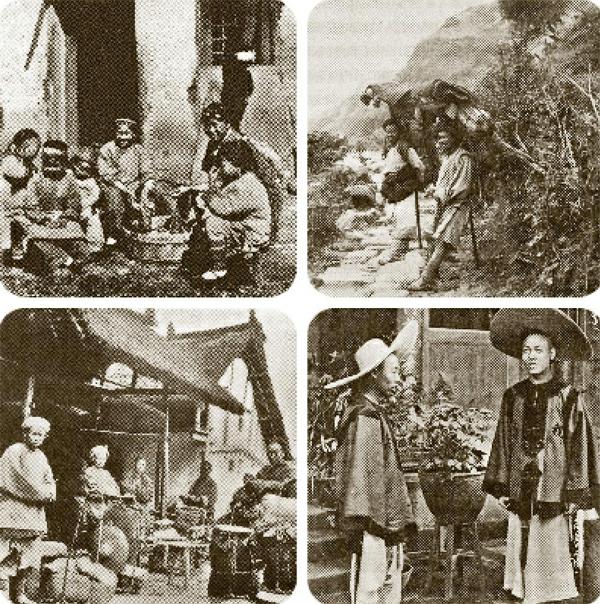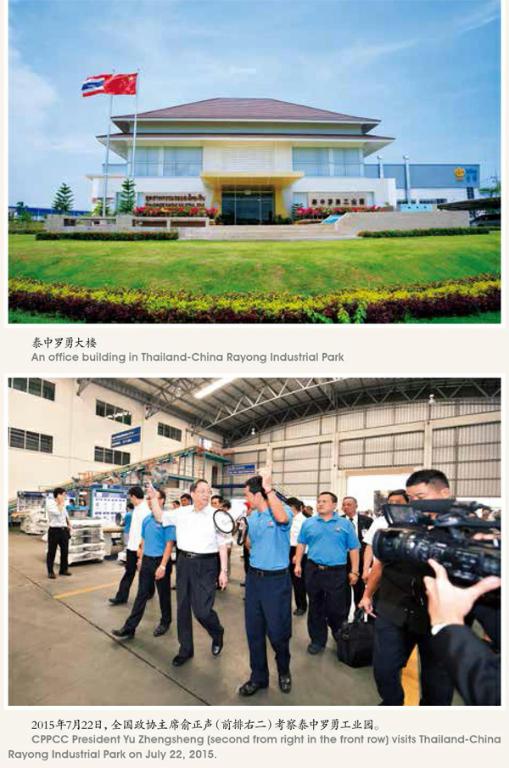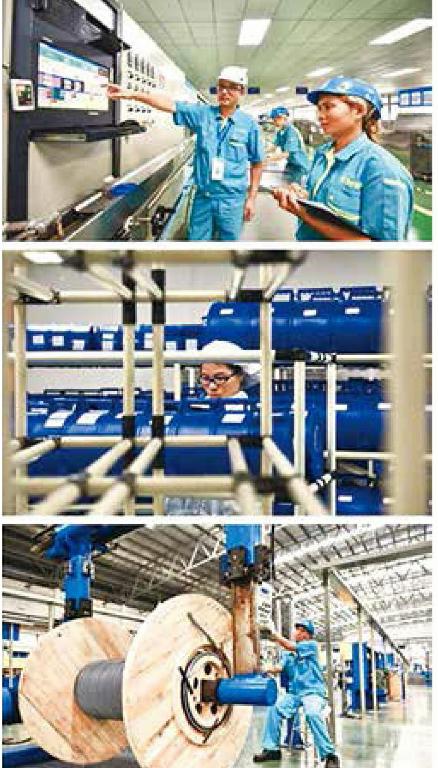工业唐人街,中泰文化交融
魏水华
唐人街是老华侨的温床、新华侨的聚会所,也是外国人眼里的小中国。今天,“唐人街”这个名词,被赋予了新的意义。
在东南亚中心、“一带一路”的支点国家泰国,靠近曼谷的罗勇府,有一座被媒体誉为“工业唐人街”的园区。这里,有几十家中国企业抱团投资建厂,以产业的特殊形式,进行着文化的传承、创新和交流。
传承文化,
原汁原味的中国味道

一排排椰林高耸入云,一片片芳草地与蓝天辉映,如果不是其间错落有致的数片厂房,如果不是树立着以泰国国旗之红蓝白三色为底色的“泰中罗勇工业园区”标志,人们或许想不到,这花园般的去处竟是工业园?更想不到,十几年前,这里还是一望无际的菠萝和木薯田地。
作为最能见证这座工业园从无到有、从小到大的人,工业园总裁徐根罗是每个来此观瞻的记者,都必须采访的对象。朋友们曾说,他的名字预示着与这片土地结缘的命运:根植于暹罗、根植于罗勇。
2000年,当时还在杭州华立集团工作的徐根罗受命来到泰国,在这里建立电子制造工厂。“我们刚来泰国办厂时,不能说是什么踌躇满志,其实更像是不知所措。当时没有厂房也没有设备,而且我本人当时也不懂泰语,就这样两眼一抹黑到了这里。”
关于那些经历的难事,徐根罗可以讲出一大堆“故事”。他说:“泰国是传统‘佛国,但较早就接受了现代经济文化的影响,中国相比之下則显得薄弱。”为了与当地人更好沟通,徐根罗组织召开了员工大会,让泰籍员工选出工人代表,企业每月定期与之沟通,了解他们的想法。“有问题的解决问题,暂时解决不了的我们就做好解释。我们还提拔当地人担任车间管理职务,效果不错。”

徐根罗特别强调了文化沟通的重要性。他告诉记者,中国企业走出去首先要认同投资所在国的文化和法律法规,要用他们的思维方式、用他们的行为方式来实现中泰两国人民的共同目标。在此过程中,应寻找彼此文化融合的切入点,一点点地交融,逐步形成和谐的劳动关系,这样才会有更高的工作效率。
徐根罗也把中国人勤勉、敬业的文化,传承到了这里。有泰国员工说:“和华立的同事们一起工作,感觉特别有劲。”
与此同时,徐根罗发现,在办厂过程中,他们走的许多弯路,其实也是在逐步熟悉当地文化的过程。“如果能有机会,我想把这个心得传递给后人,为初到泰国投资的企业提供一站式服务,让他们少走弯路。”

2005年,正值中泰建交30周年之际,华立集团与泰国企业安美得集团展开合作,在中泰两国国家领导人的见证下,《泰中罗勇工业园合作备忘录》在北京签约,项目随之启动。
徐根罗作为中方资本代表,负责组建园区运营团队,让中国企业少走弯路,让泰国百姓感受中国当代企业和文化风采,成了其后十年的工作重心。
创新思路,中泰员工互通共融
如何服务中国企业?如何服务中泰人民之间的文化交流?
泰中罗勇工业园把这方面的工作做得很细致,法律、税务、建厂、环评、培训等,撇开这些战略发展之宏大叙事不谈,只从工业园官方微信平台,就能看见中泰两国人民零距离接触的火花。
这微信平台经常推送有关泰国文化的隽永小文,也分享着与跨国投资的宝贵经验和中泰关系的深度调研……这些文章的作者,可能是工业园的运营方,可能是那些中国入园企业的员工,也可能是泰籍员工。
翻看推送记录,内容丰富详实,包括关于泰国最新投资优惠政策和工厂法摘要等实用资讯,也有“全民水仗紧急,我等奔赴主战场”的鲜活图文,有“泰国GLN全球定位码及UPC条形码知多少”这样的专业信息,也有“世界那么大,想不想到工业园来看看”的招聘启事,有投资风险研究和对克拉地峡项目的深度调研;也有麻雀早市、汤圆奶奶这样的风情点缀,不一而足。
“如今,罗勇工业园招商的三分之一强是通过互联网新媒体平台促成的,园区企业也通过这个平台互通有无,并与泰籍员工联络感情。”
2016年10月,泰国国王普密蓬·阿杜德驾崩。泰中罗勇工业园的官方微信连续一周大篇幅地进行各个角度的报道。其中一篇由一个中国员工撰写,72小时内转载和阅读就破万,除了让中方员工感染了泰国人民的悲怆情绪,也让泰方人员感受到了中国朋友对泰国国家和风俗的尊重。

另一篇题为《在泰变泰,中国人在泰国的生存之道》的文章则这样写道:“有些中方投资者陶醉于自我满足,以优越的投资者眼光来看人做事,殊不知,泰国人不‘仇富也不‘羡富。想要在泰国成就一点事业的国人,要把自己融进当地的社会,把自己变成一个泰国人,用泰国人的思维模式去行事做人。”
“融入本土文化”,正是先行者们身体力行的肺腑之言,也是他们与同行者和后来者互勉共进的中肯之语,字里行间饱含着对这片沃土的深情厚谊。
(本文照片由作者提供)
China Town refers traditionally to tightly-knit urban Chinese communities in cities across the world. In Rayong Province in the south of Thailand, an industrial park there is now referred to as Industrial China Town, where about 70 Chinese manufacturing enterprises have put their roots down and are flourishing. Many of these manufacturers are from Zhejiang, including optical-fiber-maker Futong Group and Zhongce Group, one of worlds top ten tire makers.endprint
More than a decade ago, where the industrial park is now flourishing was farmlands for growing pineapple and cassava. Xu Genluo, now CEO of the park, came to the place in 2000. Sent by Holley Group based in Hangzhou, capital city of Zhejiang Province in eastern China, he was in charge of setting up an electronics factory there. The project started from scratch. He didnt even understand a word of Thai. He can now tell a lot of stories about the start-up factory, but he ascribed the project success to the attention to cultural communication.
As the factory was taking shape, at a general meeting of all employees, locals elected some representatives. These representatives met with the management monthly. Through the mechanism, problems were solved. And if no appropriate solutions were available, explanations were provided. Locals were promoted to workshop management.
Chinese enterprises, Xu emphasizes, must first of all understand the law and culture of the country where they are going to set up shop and must understand the way local people think and do things their way. It is only through this that harmony can be found between management and labor and work efficiency can be guaranteed. All the problems he encountered in the first years, he finds, came from misunderstanding or ignorance of the local culture.
Xus career in Thailand took off in 2005 when China and Thailand signed a memo in Beijing to officially start the industrial park in Rayong Province. Xu was in charge of setting up the start-up team to build up the industrial park.
To serve Chinese enterprises that came to the industrial park, Xu and his colleagues did a pretty good job. The team provides a thorough list of dos and donts about law, taxation, construction, environmental evaluation, employee training, etc.
The management now runs a platform on WeChat, a social media platform, which can be accessed on cell phones by all employees of the industrial park. It regularly publishes short articles on Thai culture, tips for investors, analyses and investigation reports concerning China-Thai relations and investment opportunities. These articles are written by the management as well as Chinese and Thai employees of the manufacturers functioning in the park.
Thailand-China Rayong Industrial Park is a pacesetter in environmental protection. The wastewater is strictly processed and monitored everyday by a third-party wastewater processing business.
Royang Province is now an industrial powerhouse of Thailand. Chinese enterprises are big employers. Smooth and effective cultural communication is one of the biggest secrets of the success of the industrial park.endprint

